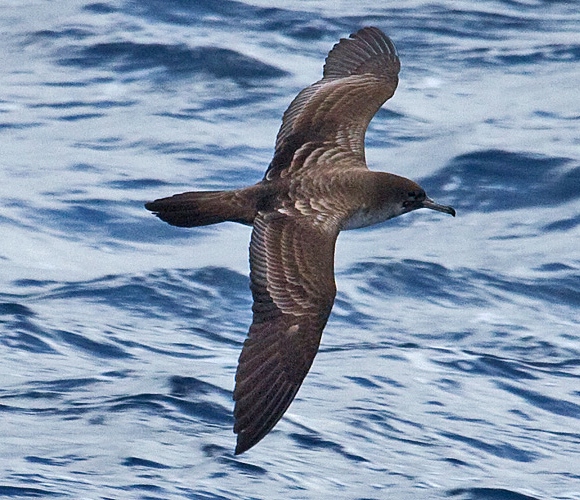 |
| Photo by Tony Morris (Flickr) |
Common name:
wedge-tailed shearwater (en); pardela-do-Pacífico (pt); puffin fouquet (fr); pardela del Pacífico (es); keilschwanz-sturmtaucher (de)
Taxonomy:
Order Passeriformes
Family Procellariidae
Range:
This species is found throughout the tropical water of the Indian and Pacific oceans, roughly between 35º S and 35º N. They breed on a wide range of oceanic islands, both in the pacific and the Indian, as well as in the west and east coasts of Australia.
Size:
These birds are 46-47 cm long and have a wingspan of 97-99 cm. They weigh around 400 g.
Habitat:
The wedge-tailed shearwater forages in pelagic, tropical and sub-tropical waters, typically preferring waters with a surface temperature above 21º C. They mainly breed in
vegetated islands, atolls and cays, but also on continental coasts in Australia.
Diet:
They feed on pelagic fish, squids and crustacean, the most common prey being goatfishes such as Decapterus macrosoma and the Symplecoteuthis sp. squids.
Breeding:
Wedge-tailed shearwaters are monogamous with pair bonds lasting for several years. Northern hemisphere birds begin breeding around February, while southern hemisphere birds begin around September. They nest in a burrow excavated on flat or flattish areas with dense grassy and tussocky vegetation , or sometimes below the cover of trees and scrubs. The female lays a single egg which is incubated by both sexes for about 50 days. The chicks are fed by both parents and fledge 103-115 days after hatching.
Conservation:
IUCN status – LC (Least Concern)
This species has an extremely large breeding range and a global population estimated to be above 5,2 million individuals. The population is suspected to be in decline owing to unsustainable levels of exploitation, persecution, predation by invasive species and the over-exploitation of tuna fisheries.







